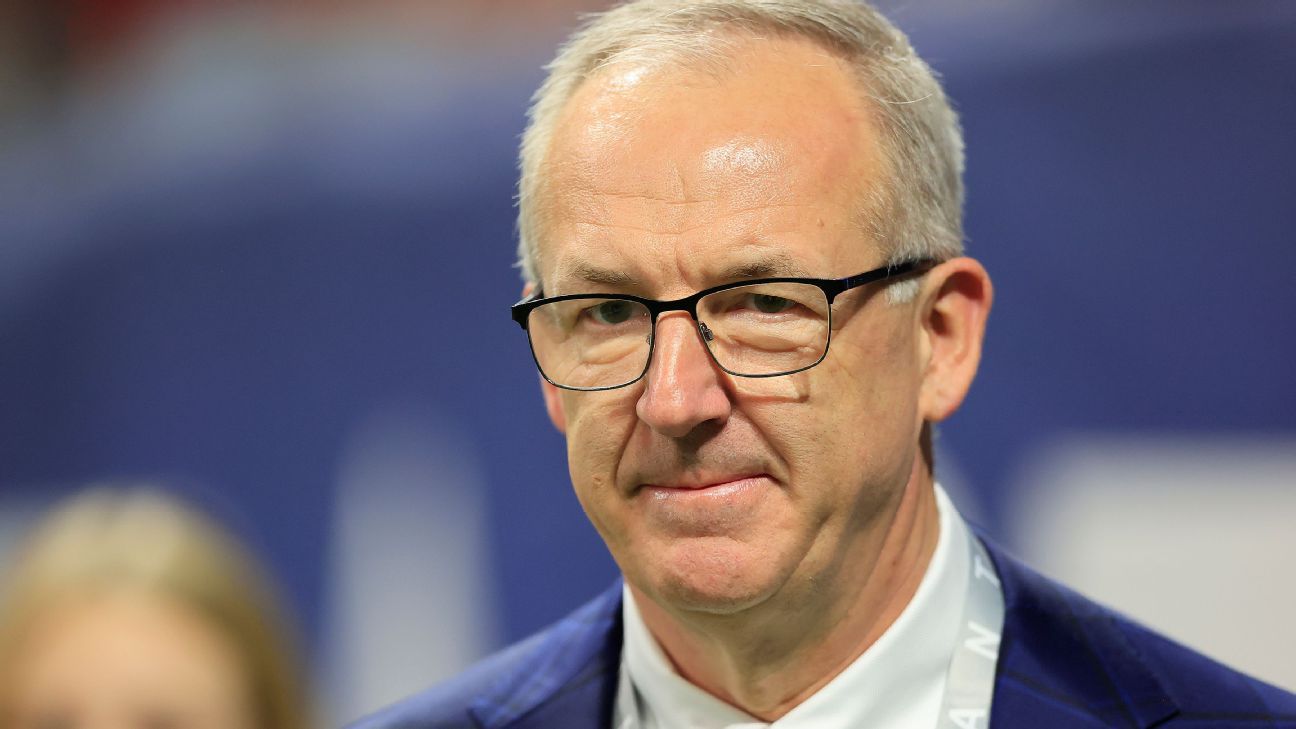IRVING, Texas — SEC commissioner Greg Sankey on Wednesday dismissed any interest in engaging in conversations about a “super league” in college athletics, instead emphasizing his belief that “there’s a lot going right” in the current landscape.
“The fact that people have interest in throwing ideas out, that’s up to them,” Sankey told a small group of reporters following the conclusion of the annual College Football Playoff spring meetings. “I spend my time on what I have to do.”
In mid-February, the search firm TurnkeyZRG circulated a confidential proposal that included seven divisions with 10 schools each, according to a copy obtained by ESPN, but it has failed to gain serious support. Sankey pushed back on the narrative that college sports is in a crisis, pointing to recent interest in private equity as proof that the NCAA has a valuable product.
“You can use the cliché, ‘If I was buying stock, I’d buy stock in college sports,'” he said. “Well, apparently a lot of people believe that outside of college sports. Something’s going right.”
Sankey’s perspective on the so-called super league comes from a position of power, as his conference is poised to be one of the largest and wealthiest with the pending additions of Oklahoma and Texas this summer, along with the new lucrative CFP revenue distribution model. This week’s CFP spring meetings marked the first in-person gathering of the FBS commissioners and Notre Dame athletic director Pete Bevacqua since the group ceded the bulk of the playoff power to the Big Ten and SEC.
Even with the balance of power shifting — and his conference engaged in a legal battle with Florida State over the league’s grant of rights and exit fees — ACC commissioner Jim Phillips said he, too, is bullish about the league’s future and the state of college athletics.
“Certainly there’s turmoil,” said Phillips, “but when you look at what has occurred — look at the numbers that we’ve seen over the course of the last two days — it’s a reaffirmation about the strength of college sports and the elasticity of it that even with pressure points within, the system continues to find its way forward in a very positive, meaningful way that is still heavily connected to the population that loves college sports.”
Phillips chaired the two-day meetings at the Ritz Carlton resort, where the commissioners and Bevacqua focused on the details of implementing the 12-team playoff this fall. While there wasn’t any discussion about the future format in 2026 and beyond, the group did make a change to its current policy surrounding the Army-Navy game.
Starting this fall, the CFP selection committee won’t consider the results of that game in its final ranking, which will be released six days earlier. Both Army and Navy will be eligible for the playoff, but a win in their final game — or a loss — won’t impact their final standing. In the previous four-team system, there was a rule for Army-Navy that would allow the committee to revise its final ranking if necessary.
The game’s iconic place in the calendar was called into question because in the new format, the five highest-ranked conference champions are guaranteed a spot in the 12-team field — meaning either Army or Navy could potentially compete for the national title if either one wins the American Athletic Conference. Part of the reason Army relinquished its independent status and joined the AAC was for a better path to the playoff, along with the revenue it brings.
CFP executive director Bill Hancock said Army and Navy both stressed their preference to leave the game where it’s currently scheduled, on the second Saturday in December.
“The selection committee will establish the final rankings on Selection Day,” Hancock said. “The results of games played after that will not be considered.”
